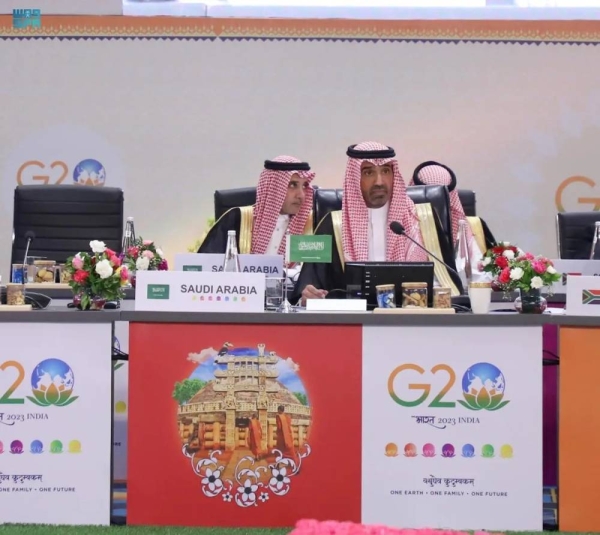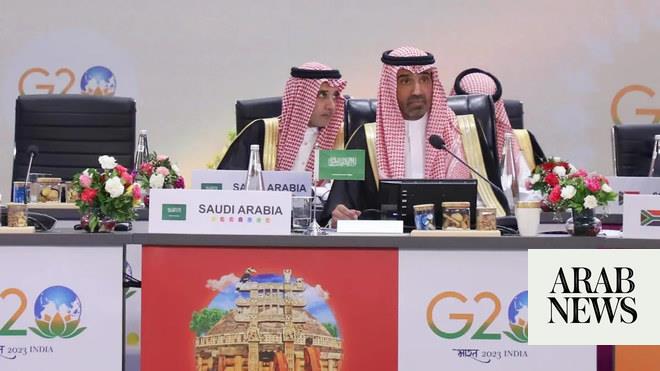
Riyadh, September 10, 2020, SPA -- The G20 Labour and Employment Ministers Meeting was concluded today by issuing a final communique which reads as follows:
"We, the Labour and Employment Ministers of the G20 members and invited countries,
met virtually on the 10th September 2020, to discuss recent global economic and labor
market developments and to advance our work towards ‘Empowering People’ and
‘Realizing Opportunities of the 21st Century for All.’ This year, COVID-19 has brought an
unprecedented global challenge with significant human costs. Fighting and
overcoming the pandemic remains our highest and overriding priority. We recognize
the importance of protecting and promoting decent jobs for all, especially for women
and youth, within our domestic and global labor markets. We support comprehensive,
robust and adaptive social protection systems and we are committed to tackling
inequalities, including gender inequalities. We acknowledge the value of bringing
together technology and a human-centered approach including by using Behavioral
Insights in employment policymaking.
The COVID-19 pandemic has had a significant impact on national and global labor
markets. Working hours declined by around 14% in the second quarter of 2020,
equivalent to the loss of 400 million full-time jobs. People employed in the informal
economy, representing 1.6 billion workers, and under-represented groups, such as
youth, women and persons with disabilities are among those in the labor market who
have been disproportionately affected. We acknowledge that job losses, reduced
working hours, suspended employment relations and income loss are likely to leave
more people vulnerable to poverty, informality and different forms of exploitation. We
recognize that young people have been acutely impacted and there is a risk that,
without effective recovery plans at the national and, where appropriate, international
level, their longer-term labor market outcomes may be negatively affected.
We will continue to work together, and in coordination with other Ministers, to help
ensure that, in the spirit of solidarity, the post-pandemic economic recovery has a jobcentric focus, to develop and implement effective measures to mitigate the impact of
COVID-19 on labor markets and societies, including through the actions set out in Annex
Recognizing the international nature of this outbreak, we will ensure a coordinated
response to the COVID-19 pandemic and, building on the G20 Labour and Employment
Minister’s COVID-19 Statement of 23rd April 2020, we will spare no effort to ensure that
labor market and economic recovery efforts prioritize sustainable and inclusive growth
in quality employment. We will work, both individually and collectively, including
through social dialogue, to support all workers experiencing job losses, suspended
employment relations, reduced working hours and income loss, while also ensuring
their health and safety at work. We will continue to provide good framework conditions
and support for employers, including micro, small and medium enterprises (MSME), to
sustain their businesses, create more flexible and resilient business models and to retain
employees, subject to national circumstances. We will support employers and
employees to leverage new technologies and embrace new working methods, where
appropriate. We will continue to support workers through training and reskilling policies
to work to ensure they are able to remain in and/or return to the labor market. We
remain committed to promoting decent work for all, including through genderresponsive approaches. We will continue to adapt and improve our social protection
systems to provide access to adequate social protection for all and will continue to
promote access to employment for all, without discrimination on any ground. We
recognize the importance of the Sustainable Development Goals to this effort.
We recognize the need to promote policy coherence by working jointly with other
Ministers, social partners and relevant International Organizations, to tackle the impact
that COVID-19 is having on national and global labor markets, in particular between
policies that promote inclusive growth, employment and social protection. We ask the
International Labour Organization (ILO) and the Organisation for Economic Cooperation
and Development (OECD) to undertake further analysis of the COVID-19 pandemic’s
impact on global labor markets and to help G20 members develop recovery solutions
that tackle the medium and long-term impact of the pandemic on national and global
labor markets.
Adapting Social Protection to Reflect the Changing Patterns of Work.
We acknowledge that social protection plays a vital role for all people, including those
who have experienced reduced income or job loss as a result of COVID-19. The COVID19 pandemic has reinforced the need for strong social protection systems to support all
workers and their families, including through crisis and recovery. We recognize that
social protection systems are facing significant and unprecedented challenges in many
of our countries, including identifying and providing adequate protection for all, in
particular the self-employed, platform workers, own account workers and workers in
informal employment. Social protection systems also need to adapt to provide
comprehensive and adequate protection to women and youth, who are often
concentrated in the lowest paid, most vulnerable sectors and disproportionately
represented in informal employment. We will continue to work individually and
collaboratively towards achieving this goal through enhanced coordination and
international efforts. Our actions will also be guided by recognition that social
protection systems, policies and programs should support sustainable and inclusive
growth and quality job creation.
With changing patterns of work linked to digital transformation, the classification of
workers employment status has significant implications for workers’ rights and access
to adequate social protection for all. We recognize that correct classification will help
support the creation of regulations and policies to reduce social protection gaps, help
minimize worker exploitation and ensure fair support from employers. Effective
monitoring, including data collection, and reporting on how social protection is
adapting to reflect the changing patterns of work is essential. We will ensure that
workers‘ rights are respected and that we develop our social protection systems to be
sufficiently robust and adaptable to provide access to adequate support for all.
We endorse the Policy Options for Adapting Social Protection to Reflect the Changing
Patterns of Work (Annex 2), to help promote the correct classification of workers. We
recognize that fostering the transition of workers from the informal to the formal
economy will contribute to expanding the coverage of social protection systems and
help ensure decent work for all.
Better Preparing Youth for the Transitions to Work.
Young people are essential to the current and future prosperity and well-being of our
societies. We reaffirm the commitment made by our Leaders in Antalya in 2015 to reduce
the share of young people who are most at risk of being permanently left behind in the
labor market by 15% by 2025. While strong progress has been made in many of our
countries, the COVID-19 crisis is disproportionally impacting youth, in particular young
women, in terms of loss of jobs, education and training opportunities, and economic
hardship, potentially damaging their long-term job and career prospects.
We commit to promoting the G20 Youth Roadmap 2025, as per our national
circumstances, to improve the labor market prospects of young people (Annex 3). We
will take measures to achieve the Antalya Youth Goal through facilitating steady and
successful labor market entry and transitions, strengthening support for young people
and tackling the additional barriers faced by young women in particular, in gaining
access to quality employment.
We ask International Organizations to report on the progress towards the Antalya
Youth Goal, calculating the rate for those not in employment, education or training
(NEET) using the 15-29 age group with gender breakdowns as a headline indicator. Along
with this indicator and based on national circumstances, countries could use a range of
auxiliary indicators with gender breakdowns to take account of the diverse labor market
situations facing youth in the G20 economies. We call upon the ILO and the OECD to
provide in-depth analysis of the progress made and policies implemented, based on the
annual self-reporting in our G20 Employment Plans.
Achieving Gender Equality in the World of Work.
We affirm our commitment to meet the goal our leaders agreed in Brisbane in 2014,
“to reducing the gender gap in the participation rates between women and men in our
countries by 25% by 2025”, and in line with the Agenda 2030 framework. We welcome
the annual monitoring report by the ILO and the OECD. We recognize that while
progress has been made since 2014 more efforts are necessary, including in increasing
the quality of women’s employment, and in advancing equal pay for equal work or work
of equal value. We also recognize the disproportionately negative impact of the COVID19 crisis on women´s paid and unpaid work. This is due to both the nature of their jobs
and to increased disruptions related to care giving responsibilities, which increase the
risk of their withdrawal from the labor market. At the same time, we acknowledge that
women have the potential to be drivers of the economic recovery from the COVID-19
crisis. We therefore commit to ensuring that these Brisbane objectives will remain high
in our policy agendas, throughout the recovery period and beyond, to avoid any reversal
of progress made so far. We will ensure that the recent decreases in women’s labor force
participation do not become structural, and that quality jobs growth benefits all people.
We recognize that women, particularly young women and women from
disadvantaged groups, often face additional barriers to gaining access to the labor
market and decent jobs, as well as to equal career opportunities and leadership
positions. These barriers often include gender stereotypes, especially about the role of
women in the economy, discrimination in employment, unequal distribution of care
responsibilities, unequal access to training, violence and harassment at work and
persistent gender pay gaps. We will encourage access to quality and affordable care
services, a more balanced sharing of household and care responsibilities between
women and men, including men‘s take-up of family related leave and reducing gender
inequalities in job quality, access to education and training as well as pay and pension
gaps.
Exploring Behavioral Insights Application for Robust Labor Market Policies.
Labor markets continue to undergo extensive transformation. Globalization,
digitalization and technological developments remain major drivers of change and,
while presenting significant benefits, these changes may also pose significant
challenges to labor markets, societies and policy makers alike, particularly when coupled
with the impact of COVID-19 on workers and employers across the world. These
challenges have become even more apparent and should be addressed to enhance
access to opportunities for all and make our societies more inclusive. We need
innovative and timely measures to help policy makers meet these challenges, as well as
the longer-term challenges faced by youth, women, and vulnerable and excluded
groups in general, including in the recovery from the economic crisis caused by the
pandemic.
Scientific inquiry and technology remain pivotal to evidence-based decision-making.
Seeking to better understand the drivers of human behavior can help produce better
tailored, more effective and adaptive policies to meet the diverse needs of our labor
markets. Many G20 members already promote evidence-based policy approaches.
We acknowledge the benefits that exchanging knowledge and experience on
behavioral insights may offer. We welcome Saudi Arabia’s leadership in the
establishment of the G20 Behavioral Insights Knowledge Exchange Network, facilitated
by the Riyadh Behavioral Insight Center for Labor Market Policies (Annex 4)Way Forward.
In light of the extensive impact of the COVID-19 pandemic on our economies, we will
adapt and improve our social protection systems to help ensure that they provide access
to adequate protection for all, and will scale up our efforts to support our youth,
including through a G20 Youth Roadmap 2025, that will help us to achieve the 2015
Antalya Youth Goal. We will tackle the various barriers faced by women with regards to
entering and advancing within the labor market, in order to achieve our commitment
to reducing the gap between women and men in labor force participation as well as
improving the quality of women’s employment, as agreed in Brisbane in 2014 and
reinforced in Bad Neuenahr in 2017. We will continue to monitor the Brisbane goal, as
stated in the Osaka leaders’ statement, to further develop our G20 Employment Plans,
to provide greater focus on the achievement of these goals.
As our countries continue to manage the impact of the pandemic and prepare for
the recovery, we will work together with other Ministers and G20 tracks in support of our
commitments on areas such as promoting inclusive, job rich, sustainable and human
centered economic growth, with quality employment for youth and women, and access
to adequate social protection for all. We reaffirm our commitment to social dialogue and
that it must remain at the heart of policymaking during the COVID-19 crisis and in the
recovery phase.
We reaffirm our commitment to strong, sustainable, balanced and inclusive global
growth, and to promoting decent work for all workers, including within global supply
chains. We will continue to promote the Fundamental Principles and Rights at Work
and the ILO Centenary Declaration for the Future of Work, 2019. We will continue our
efforts to eradicate child labor, forced labor, human trafficking and modern slavery in
the world of work. On the eve of the International Year of 2021 on The Elimination Of
Child Labor, we welcome the historic universal ratification on ILO Convention n°182 on
the worst forms of child labor. Safe and healthy working conditions, including the ability
to safely enter and/or resume work, are fundamental to decent work, especially in view
of the risks highlighted by the COVID-19 pandemic. We welcome the Vision Zero Fund
and similar initiatives implemented by the ILO, such as the Better Work Program, as
instruments to help mitigate the impact of the pandemic on Occupational Safety and
Health, and to better prepare for future public emergencies. We reaffirm the importance
of sharing best practices through the G20 Occupational Safety and Health (OSH) Experts
Network on mitigating measures to improve occupational safety and health policies and
to protect all workers, including those who have been impacted as a result of the COVID19 pandemic.
We acknowledge and appreciate the support and informative reports received from
International Organizations, including the ILO, the OECD and the International Social
Security Association (Annex 5). We value the input, experience and expertise received
from the World Bank Group and particularly stress the cooperation of our social
partners, L20 and B20. We will continue to work collaboratively with these valued
partners and other engagement groups as appropriate.
We thank the Saudi Arabian Presidency for its dedication and leadership throughout
2020 and we look forward to the Italian Presidency in 2021."
--SPA
23:30 LOCAL TIME 20:30 GMT
0023
www.spa.gov.sa/w1408438







